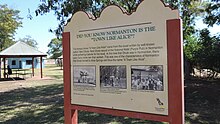A Town Like Alice
In post-World War II London, Jean Paget, a secretary in a leather goods factory, is informed by solicitor Noel Strachan that she has inherited a considerable sum of money from an uncle she never knew.The second part of the story flashes back to Jean's experiences during the war, when she was working in Malaya at the time the Japanese invaded and was taken prisoner together with a group of women and children.Jean meets an Australian soldier, Sergeant Joe Harman, also a prisoner, who is driving a lorry for the Japanese and they strike up a friendship.Without revealing Jean's actual whereabouts, Strachan persuades Joe to return home by ship and intimates that he may well receive a great surprise there.While staying in Willstown, awaiting Joe's return, Jean learns that most young girls have to leave the town to find work in the bigger cities.Having worked with a firm in Britain that produced crocodile-leather luxury goods, she gets the idea of founding a local workshop to make shoes from the skins of crocodiles hunted in the outback.With the help of Joe and of Noel Strachan, who releases money from her inheritance, she starts the workshop, followed by a string of other businesses; an ice-cream parlour, a public swimming pool and shops.[10] It was shown in Japan under the title Malay Death March: A Town Like Alice(Maree shi no koshin: Arisu no yo na machi (「マレー死の行進:アリスのような町).In 1981 it was adapted into a popular television miniseries called A Town Like Alice, starring Helen Morse and Bryan Brown (with Gordon Jackson as Noel Strachan).
A Town Like Alice (disambiguation)Nevil ShuteHeinemannSoftcoverWorld War IIMalayaAlice SpringssolicitorJapaneseQueenslandoutbackGolden CasketFar EastDeath RailwayThe Bridge over the River KwaiSumatraPadangDutch East IndiesHerbert James "Ringer" EdwardsstationcrucifiedBurma Railwaylast mealBurketownNormantonBurke and WillsA Town Like AliceVirginia McKennaPeter FinchJack LeeminiseriesHelen MorseBryan BrownGordon JacksonMasterpiece TheatreJason ConneryBecky HindleyBernard HeptonSony AwardMargaret DryburghTenko (TV series)Paradise RoadTown Called MaliceThe JamWayback MachineFaded PageStephen MorrisMarazanSo DisdainedLonely RoadRuined CityWhat Happened to the CorbettsAn Old CaptivityPied PiperMost SecretPastoralVinland the GoodThe Chequer BoardNo HighwayRound the BendThe Far CountryIn the WetRequiem for a WrenBeyond the Black StumpOn the BeachThe Rainbow and the RoseTrustee from the ToolroomThe Seafarers